Learning communities and overcoming poverty in Brazil
Abstract
Object: Brazil has implemented social programs to meet the Millennium Development Goals of reducing poverty and inequality. Despite the good results still there are ghettos and educational and social inequalities. Moreover Learning Communities are responding to these needs by promoting education based on successful actions scientifically proven of which promote educational change and social inclusion. The aim of this article is to highlight the characteristics of Learning Communities that allow overcoming poverty, and in this perspective, explain the implementation of the Learning Communities in Brazil and how, in this way, it is creating the conditions for effective overcoming give poverty and inequality in this country.
Design / methodology: This article is based on documentary analysis of reports of the INCLUD-ED - the project on school education more scientific resources has been funded by the European Union, United Nations / ECLAC, Brazilian public agencies and websites of official institutions that promote Learning Communities in Brazil. Brazilian Institute of Geography and Statistics are also collected.
Contributions and results: It highlights successful actions that contribute to overcoming poverty and social exclusion. Such actions are based on dialogic learning, democratic management and the formation of heterogeneous groups. It is observed that in Brazil are carrying out such actions and the ongoing expansion of the project in the country is creating the conditions for effective poverty reduction.
Added value: This article reveals specific elements of overcoming poverty through education.
Keywords
Full Text:
PDF[es]DOI: https://doi.org/10.3926/ic.657
This work is licensed under a Creative Commons Attribution 4.0 International License
Intangible Capital, 2004-2024
Online ISSN: 1697-9818; Print ISSN: 2014-3214; DL: B-33375-2004
Publisher: OmniaScience








